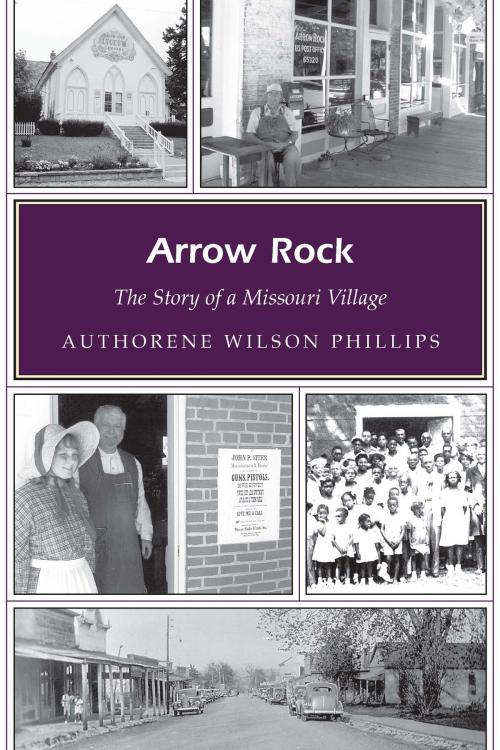Arrow Rock
The Story of a Missouri Village
Nonfiction, Social & Cultural Studies, Social Science, Cultural Studies, Native American Studies, History, Americas, United States| Author: | Authorene Wilson Phillips | ISBN: | 9780826264640 |
| Publisher: | University of Missouri Press | Publication: | June 15, 2005 |
| Imprint: | University of Missouri | Language: | English |
| Author: | Authorene Wilson Phillips |
| ISBN: | 9780826264640 |
| Publisher: | University of Missouri Press |
| Publication: | June 15, 2005 |
| Imprint: | University of Missouri |
| Language: | English |
Arrow Rock, so named because Native Americans once went there to shape their arrowheads from the flint found along the Missouri River, is a small historic village. Today fewer than one hundred people call Arrow Rock home, but its scenic location and rich history continue to attract thousands of visitors every year.
In June 1804, the Corps of Discovery passed “the big arrow rock,” as William Clark noted in his journal, “a handsome spot for a town . . . the situation is elegant, commanding and healthy, the land about it fine, well-timbered and watered.” Settlers soon arrived, some bringing slaves who developed the large farms; the village that was established grew slowly but saw profits from trade on the river. The beginnings of trade in the far west, the gold rush, and the Civil War all had profound effects on the settlers.
Meanwhile, area residents were having an effect on the world. George Caleb Bingham, who became known as the “Missouri artist,” participated in the founding of the town and built a home there, and Dr. John Sappington, an early resident of Arrow Rock, saved thousands of lives by perfecting a treatment for malaria. Also calling Arrow Rock home were numerous influential politicians, including three governors, M. M. Marmaduke, Claiborne Fox Jackson, and John Sappington Marmaduke.
Life changed after the Civil War, and Arrow Rock changed, too. As railroads and major highways bypassed the town, many people moved away and fewer came through. Arrow Rock provides insight into the progression of history and its effects on one small Missouri town. The story of this village, now a historic site, brings to life the history of America: early days of settlement, an era of prosperity and power for some and incredible hardship for others, wars, a decline, and a rebirth. In addition, the long roll call of those who visited the area provides a history of the opening of the West.
This book will prove valuable to those interested in Missouri history; the developing nation; and the geographical, political, and recreational forces that were at work as so many came and went. Like a visit to Arrow Rock itself, this book allows readers to step back into history and appreciate a time when the river was the highway.
Arrow Rock, so named because Native Americans once went there to shape their arrowheads from the flint found along the Missouri River, is a small historic village. Today fewer than one hundred people call Arrow Rock home, but its scenic location and rich history continue to attract thousands of visitors every year.
In June 1804, the Corps of Discovery passed “the big arrow rock,” as William Clark noted in his journal, “a handsome spot for a town . . . the situation is elegant, commanding and healthy, the land about it fine, well-timbered and watered.” Settlers soon arrived, some bringing slaves who developed the large farms; the village that was established grew slowly but saw profits from trade on the river. The beginnings of trade in the far west, the gold rush, and the Civil War all had profound effects on the settlers.
Meanwhile, area residents were having an effect on the world. George Caleb Bingham, who became known as the “Missouri artist,” participated in the founding of the town and built a home there, and Dr. John Sappington, an early resident of Arrow Rock, saved thousands of lives by perfecting a treatment for malaria. Also calling Arrow Rock home were numerous influential politicians, including three governors, M. M. Marmaduke, Claiborne Fox Jackson, and John Sappington Marmaduke.
Life changed after the Civil War, and Arrow Rock changed, too. As railroads and major highways bypassed the town, many people moved away and fewer came through. Arrow Rock provides insight into the progression of history and its effects on one small Missouri town. The story of this village, now a historic site, brings to life the history of America: early days of settlement, an era of prosperity and power for some and incredible hardship for others, wars, a decline, and a rebirth. In addition, the long roll call of those who visited the area provides a history of the opening of the West.
This book will prove valuable to those interested in Missouri history; the developing nation; and the geographical, political, and recreational forces that were at work as so many came and went. Like a visit to Arrow Rock itself, this book allows readers to step back into history and appreciate a time when the river was the highway.















